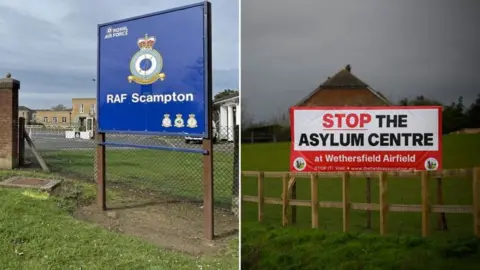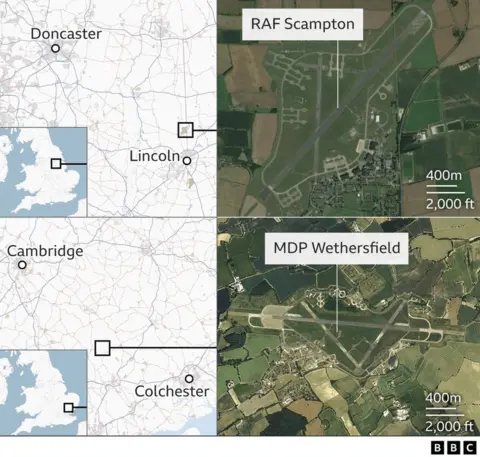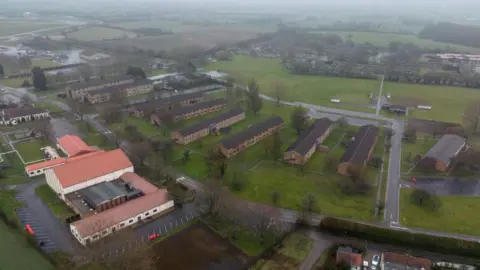Asylum seekers plan for disused RAF stations lawful, judge rules
 PA Media/Getty Images
PA Media/Getty ImagesGovernment plans to use two former RAF stations to house thousands of asylum seekers can progress, the High Court has ruled.
At a recent London hearing, West Lindsey District Council argued the use of land at RAF Scampton in Lincolnshire should be stopped.
Braintree District Council in Essex also challenged changes to ex-RAF Wethersfield, along with a resident.
However, Mrs Justice Thornton dismissed the claims for a judicial review.
The Home Office is expected to apply for a Special Development Order to use MDP Wethersfield and RAF Scampton as asylum centres for three years until 2027.
Up to 2,000 male asylum seekers could be housed at RAF Scampton, where the Dambusters were based during World War Two, when operational.
The BBC understands there are currently about 600 asylum seekers living in refurbished barracks and portable buildings at MDP Wethersfield.
Plans are in place to house up to 1,700 single men at the Essex site.
At the two-day hearing on 31 October and 1 November, lawyers representing the councils made complaints about ministers' use of emergency planning rules and also raised concerns about migrants being housed for longer than an initially envisaged 12 months.
Gabriel Clarke-Holland, a resident of Braintree in Essex, also challenged the plans for Wethersfield after crowdfunding his legal action.

Ministers from the Home Office and Department for Levelling Up, Housing and Communities fought the claims.
In her ruling, Mrs Justice Thornton wrote: "The Secretary of State for the Home Department has statutory responsibility to provide accommodation and other support to asylum seekers and their dependants who would otherwise be destitute.
"Since the Covid-19 pandemic, the number of asylum seekers requiring accommodation has reached unprecedented levels.
"As a result of the strains on the asylum system, in January 2023, the Home Office approached the Ministry of Defence and other government departments enquiring about availability of Crown Estate assets which could be made suitable in the short term to assist with accommodating asylum seekers.
"A submission to the minister for immigration, dated 27 January 2023, sought a decision to explore the use of RAF Wethersfield and RAF Scampton to accommodate single adult male asylum seekers."
 Getty Images
Getty ImagesDuring the hearing, Paul Brown KC, for the home secretary, told the High Court the increasing numbers of people seeking asylum was a clear emergency and therefore emergency planning powers - known as Class Q of the Town and Country Planning Act - were required.
Under Class Q, sites can be used without the need to adhere to the usual planning process for a 12-month period.
"The Secretary of State used the legally correct construction of emergency in the emergency statement," the judgment said, adding the "reliance on Class Q was, in the court's view, lawful".
Following the ruling, Braintree District Council requested permission from to appeal against the decision and said it was awaiting "to hear more if this is granted".
Mr Clarke-Holland also announced his intention to appeal.
"The evidence strongly suggests that we were misled by the government, especially about how long they planned to use the site," he said.
Sir Edward Leigh, Conservative MP for Gainsborough, said he was "disappointed at the result" for RAF Scampton, which is in his constituency.
"I understand West Lindsey District Council intends to appeal and has solid grounds for doing so," he wrote on X, formerly Twitter.

In March, West Lindsey District Council agreed a £300m deal with Scampton Holdings Limited to revive the site as a business, aerospace and heritage centre.
Sir Edward previously said he was concerned the "site might start deteriorating" if the asylum centre plans went ahead and Scampton Holdings "might give up".
Councillor Trevor Young, Liberal Democrat leader of the local authority, said it had already been given leave to appeal.
"We've always said it was the wrong place and we still believe that," he said.
The Home Office welcomed the judgment.
"Using surplus military sites provides more orderly accommodation for those arriving in small boats while reducing the use of hotels, as we continue to deliver our plan to stop the boats," a spokesperson said.
"We are working with councils and key partners to manage the impact of using these sites, including liaising with local police to make sure appropriate arrangements are in place."
